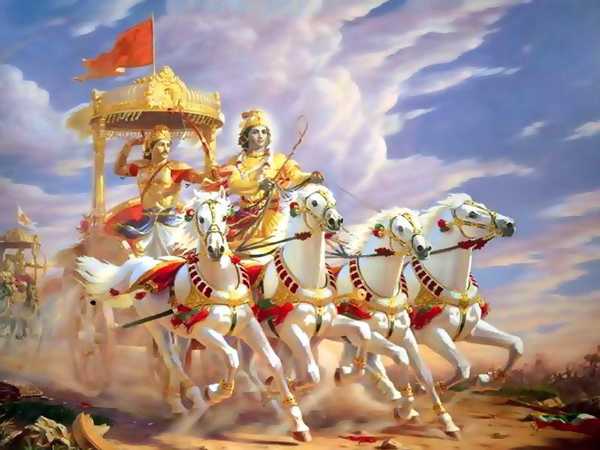Chapter 20

“Krishna said,–both Hansa and Dimvaka have fallen; Kansa also with allhis followers has been slain. The time hath, therefore come for thedestruction of Jarasandha. He is incapable of being vanquished in battleeven by all the celestials and the Asuras (fighting together).
We think,however, that he should be vanquished in a personal struggle with barearms. In me is policy, in Bhima is strength and in Arjuna is triumph; andtherefore, as prelude to performing the Rajasuya, we will certainlyachieve the destruction of the ruler of Magadha. When we three approachthat monarch in secret, and he will, without doubt, be engaged in anencounter with one of us. From fear of disgrace, from covetousness, andfrom pride of strength he will certainly summon Bhima to the encounter.Like death himself that slays a person however swollen with pride, thelong-armed and mighty Bhimasena will effect the destruction of the king.If thou knowest my heart, if thou hast any faith in me, then make over tome, as a pledge, Bhima and Arjuna without loss of time!”
“Vaisampayana continued,–Thus addressed by the exalted one,Yudhishthira, beholding both Bhima and Arjuna standing with cheerfulfaces, replied, saying–‘O Achyuta, O Achyuta, thou slayer of allenemies, say not so. Thou art the lord of the Pandavas! We are dependenton thee. What thou sayest, O Govinda, is consistent with wise counsels.Thou never leadest those upon whom Prosperity hath turned her back. I whostay under thy command regard that Jarasandha is already slain, that themonarchs confined by him have already been set free, that the Rajasuyahath already been accomplished by me. O lord of the universe, O thou bestof persons, watchfully act thou so that this task may be accomplished.Without ye then I dare not live, like a sorrowful man afflicted withdisease, and bereft of the three attributes of morality, pleasure andwealth. Partha cannot live without Sauri (Krishna), nor can Sauri livewithout Partha. Nor is there anything in the world that is unconquerableby these two, viz., Krishna and Arjuna. This handsome Bhima also is theforemost of all persons endued with might. Of great renown, what can henot achieve when with ye two? Troops, when properly led, always doexcellent service. A force without a leader hath been called inert by thewise. Forces, therefore, should always be led by experienced commanders.Into places that are low, the wise always conduct the water. Evenfishermen cause the water (of tank) to run out through holes.(Experienced leaders always lead their forces noting the loopholes andassailable points of the foe). We shall, therefore, strive to accomplishour purpose following the leadership of Govinda conversant with thescience of politics, that personage whose fame hath spread all over theworld. For the successful accomplishment of one’s purposes one shouldever place Krishna in the van, that foremost of personages whose strengthconsists in wisdom and policy and who possesseth a knowledge of bothmethod and means. For the accomplishment of one’s purpose let, therefore,Arjuna, the son of Pritha, follow Krishna the foremost of the Yadavas andlet Bhima follow Arjuna. Policy and good fortune and might will (then)bring about success in a matter requiring valour.’ Vaisampayanasaid,–‘Thus addressed by Yudhishthira, the trio Krishna, Arjuna andBhima, all possessed of great energy, set out for Magadha attired in thegarb of Snataka Brahmanas of resplendent bodies, and blessed by theagreeable speeches of friends and relatives. Possessed of superior energyand of bodies already like the Sun, the Moon, and the Fire, inflamed withwrath at the sad lot of their relative kings, those bodies of theirsbecame much more blazing. And the people, beholding Krishna and Arjuna,both of whom had never before been vanquished in battle, with Bhima inthe van, all ready to achieve the same task, regarded Jarasandha asalready slain. For the illustrious pair (Krishna and Arjuna) were mastersthat directed every operation (in the universe), as also all actsrelating to the morality, wealth, and pleasure of every being. Having setout from the country of the Kurus, they passed through Kuru-jangala andarrived at the charming lake of lotuses. Passing over the hills ofKalakuta, they then went on crossing the Gandaki, the Sadanira(Karatoya), and the Sarkaravarta and the other rivers taking their risein the same mountains. They then crossed the delightful Sarayu and sawthe country of Eastern Kosala. Passing over that country they went toMithila and then crossing the Mala and Charamanwati, the three heroescrossed the Ganges and the Sone and went on towards the east. At lastthose heroes of unfaded glory arrived at Magadha in the heart of (thecountry of) Kushamva. Reaching then the hills of Goratha, they saw thecity of Magadha that was always filled with kine and wealth and water andrendered handsome with the innumerable trees standing there.'”




